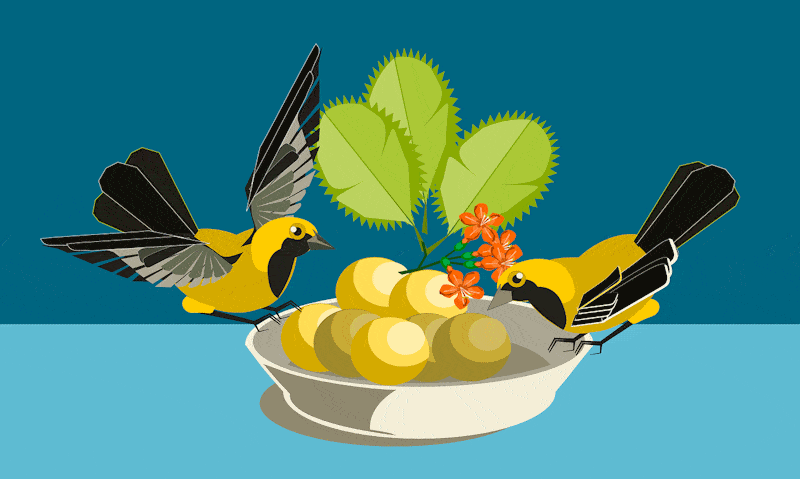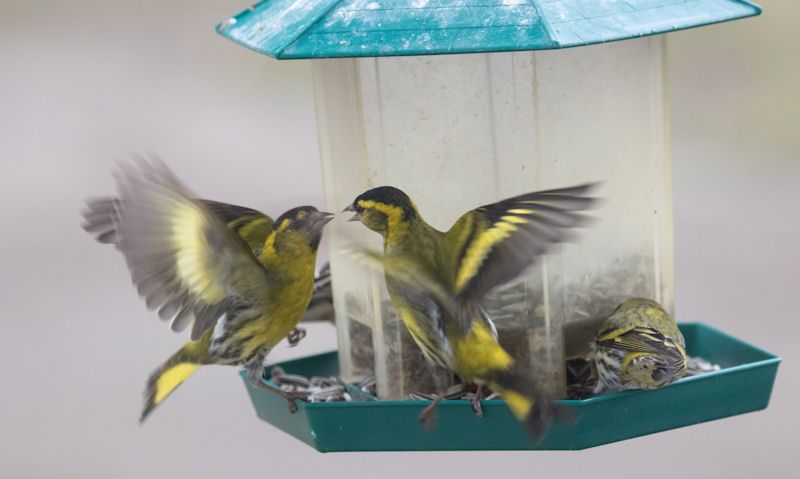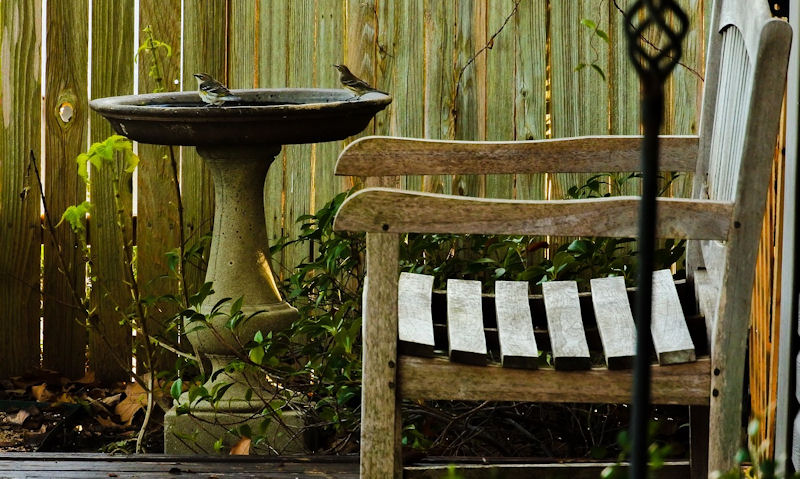What fruits can birds eat
If you wish to feed wild birds fruit but you have your concerns, don't; its perfectly acceptable to feed garden birds all types of fruits, from the basic to the exotic.
British wild birds can eat all types of fruits, including those native to UK and any imported, exotic, tropical fruit can be offered. High in nutritional value, there's vitamins and fibre from the juicy soft centre to eat and sip from. Present tough skin fruit cut in half, well soft fruit can be left whole.
Value in feeding fruits to birds come from the important nutrients, well birds are likely to benefit from vitamins and fibre, its a nice treat to leave out fruit from time to time.
Birds that do eat fruit are the unwanted gulls and crows, but you can see Jackdaws, Pied Flycatchers and Warblers if you're lucky enough.
Well most birds won't sense the presence of fruit until they get a whiff in the air, so you'll need to attract birds to your garden by cutting fruit up in half, in slices or wedges.
Hard leathery fruits such as oranges will need to be cut up as the skin is tough to get in.
And well soft centred fruits such as peaches, strawberries and raspberries can be left whole, it might be a good idea to cut a few up.
Its up to you where you locate the fruit in the garden, but under the bird table is a good start, and so is the mesh feeding tray or dish.
Nutrients birds will benefit from
Most nutrients found in all fruits mentioned that will benefit British birds are; vitamin A, vitamin C and fibre.
Birds that eat any citrus or stone fruit are set to benefit with vitamins, well any birds that eat apples and pears, will consume a valuable intake of fibre.
Well all fruits are set to serve a number of calories, which are vital for building up when food is scarce.
No fat is found in fruit so would benefit less in winter when fat storage is vital at that time.
Birds that eat fruit
We can say for certain and we must agree they're probably the types of birds you don't want to attract to feed in your garden, but crows and gulls would eat fruit left out.
But if we look at the birds you'd want to attract then look at the Jackdaw, Moorhen, Pied Flycatcher, Stonechat, Whitethroat and Willow Warbler.
Birds that frequent your garden most often that would be happy to eat fruit includes the always reliable Robin, followed by the Starling.
First set of wild birds mentioned only apply to a few of us as they're rarely seen in most gardens across the UK, well Robins and Starlings would be seen the most.
Cut in half, wedges or leave whole
When laying out fresh fruit or the bruised kind it will depend on the type of fruit how you present it to birds.
Take for example, hard leather skin of the orange, melon or banana, birds will find it hard to break through the tough skin so you'll need to offer it to them out of the skin.
If some fruits are not opened, the birds may not be able to sniff it out, therefore deterring them from trying it all together.
So in the case of bananas, melons and oranges, its recommend you cut the orange and melon in half or wedges, well the banana skin can be partially peeled.
Never remove the tough skin fruit entirely from the protected skin or peel as it provides a weight to keep it in place as the birds feed - plus it saves making a mess.
And well apples and pears should also be cut in half or wedges, to present soft skin fruit like grapes, strawberries, peaches and plums, we would advice cutting them in half also to release the sweet tasting smell into the air.
Presenting fruit in garden
Where you present fruit in the garden matters as it should be clearly visible to any passing birds above, as well has the small common garden birds that drop by.
Its never a good idea to insert fruit - cut or left whole - into the many bird feeders available, it just wouldn't work as fruit is soft and soggy, resulting in it getting wedged in the feeders, especially the plastic tube seed feeders.
Instead, leave out fruit for birds under the bird table on a wiped clean covered platform.
If you don't have a bird table on a stand, position the cut fruit on a wall or fence post which may be enough to entice birds.
It is possible to get a apple bird feeder for sale within the UK, well it can be used to impale apples on a spike, it will also work for oranges, pears and all types of small soft centred fruits.
Keep it clean
Its vital you keep the surface where the fruit is laid out clean at all times, just as you would present feed in a clean bird feeder, it should be the same with fruit.
As it would probably be left out on an open flat mesh feeding tray or dish, be sure to remove any remaining fruit before cleaning the surface with soapy water.
Likewise, if you do decide to use an apple bird feeder make sure the spike and the whole feeder is washed after use.
Its perfectly fine leaving fruit on say a garden table, but it will need to be washed well as you'll smell it for days as it embeds into the wood grain.
Let's dig a little deeper to see just what sorts of fruits you can offer birds, starting with...
Apples & Pears
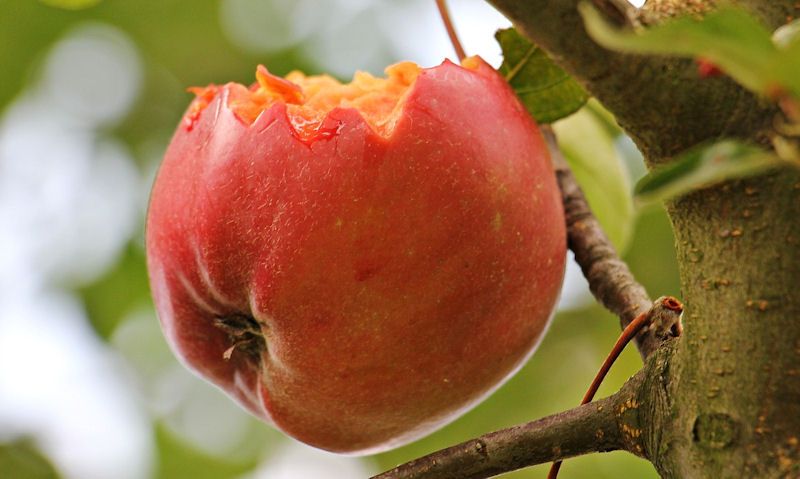
Well native to Britain, apples and pears are widely available to birds out in the wild, so the apple in partially would be the ideal fruit to offer them.
And well pears are likely to be grown from specialist farmers, this fruit is not readily available to common British birds as much, though they will eat it.
Apples grown naturally in countryside or on an apple tree in our gardens can be infested by wild birds, so it highly likely those apple eating birds will eat them if offered.
Well these apples are usually reserved for cooking only; its the sweetest, juiciest apples that people consume that is most likely to entice birds in our gardens.
To present apples to birds, you could cut it in half and leave it under the bird table, although we would recommend use of an apple bird feeder if fed to them regularly - its not worth the expense if its a one off.
The use of an apple bird feeder for wild birds also extends to use with pears which will impale perfectly onto the spike - and that's not including oranges, strawberries, etc.
Berries
When we talk about berries to feed birds we're referring to the shop-bought berries you can buy in the supermarket, not native shrub red berries that birds eat out in the wild.
And well the following berries are native to Britain; raspberries, grapes and blueberries, they're all safe for wild birds to consume as they're healthy for people.
Berries that people consume, people will also enjoy feeding to birds are grapes in partially, as they're a good size for birds to take away, with an option to eat them at the bird table.
Well grape are largely grown in the UK in grapevines, growers cover the vines in netting as to stop the wildlife helping themselves.
This also goes for strawberries, a number of wild birds do eat strawberries thanks to the sweetness they offer, along with the fleshy centre for sipping juice.
Strawberries are usually grown in greenhouses or under plastic, so birds are unlikely to be used to eating such a fruit in Britain.
So make sure you include strawberries in the wild bird fruit basket when the time comes.
Not native here are Kiwifruit, Passionfruit and even Avocados which can all be offered to British birds, just as long as they're ripe and soft.
Citrus
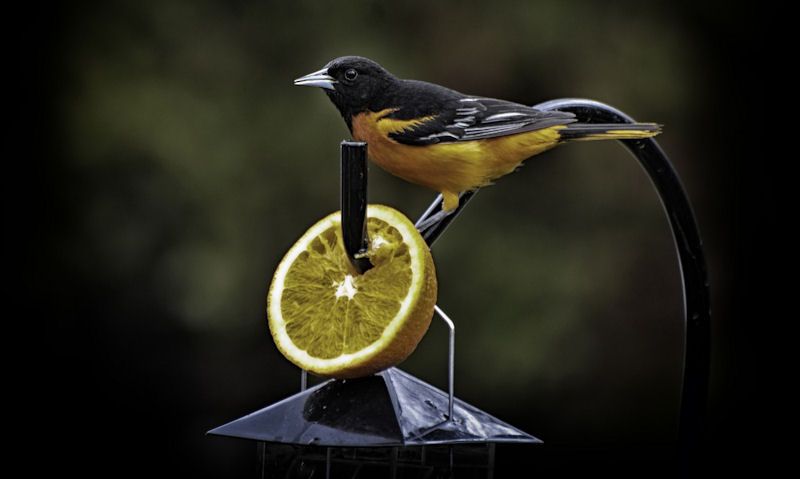
Despite the sourness of most citrus fruits, it is possible birds will try sipping the juice well attempting to eat at the fleshy centre.
And well all citrus fruit comes in a tough, leathery skin it can only be offered to birds if you cut them in half or into wedges.
Using the spike to impale them on the apple bird feeder would be an ideal solution.
Well we've explained in detail whether wild birds can eat oranges; its a resounding yes and that goes for all types of citrus fruit.
As oranges are widely available and cheaper to buy, you might want to try your hands there before investing in other citrus fruit types.
No citrus fruit is native to Britain so its not something British birds have evolved with, so its something new that might need time and patience.
Citrus fruits to offer birds include: oranges, grapefruits, mandarins and limes.
Melons
Great big watermelons and all related types can be fed to wild birds, though how you go about presenting a melon to a bird is another matter.
If left as it is birds will never be able to peck there way through the thick leather skin, so you'll need to chop it up before leaving it out in the garden.
Well its possible to cut a melon in half and offer it birds that way, they could then use the outer skin as a perch as they eat or sip on the soft juicy centre.
To to stop it rolling you use a series of stones or rocks beneath it to keep it in place.
However, you're free to cut the melon into multiple wedges and leave them out in the garden this way, though to thin wedges will need to be positioned flat down on the side.
You could scoop out the melon centre all together and offer the soft centre to the birds in a bowl you've reserved for them, well throwing away the tough skin.
Well watermelons are the obvious and most widely available melon in the UK, it is possible to feed birds rockmelons and honeydew melons if given the chance.
Offering melons to wild birds regardless of how you present it to them should always include the seeds contained within.
Stone
Remarkably, you're likely to see all types of stone fruits grown here in the UK, weather permitted, so is widely available.
All of which can be fed to wild birds as whole or cut in half to help them get started.
Don't worry about the stone centre, it will cause no issues for birds as they focus on the soft fleshy centre for eating a drinking.
Well birds do eat seeds the stone in all stone fruits are usually to big and hard for them to consume, so would probably be left, if not having a few interested birds.
Feed wild birds any of the following; nectarines, apricots, peaches and plums.
Juicy fruits are likely to get messy, so as long as you clean up after use you won't have to worry about the smell embedding into the wood, lasting for weeks.
Tropical
So well passionfruit is classed as a tropical fruit, you won't see it mentioned here as we're thrown into a fruit class of berries, which we've talk about above.
If they try it they may enjoy tropical fruit, but this is a harder one to entice birds as the options are reduce.
One tropical fruit you can absolutely try in the garden is with a banana, quite a reliable fruit that can bruise and blacken.
So don't throw them away, pick a spot on the garden, peel it before leaving it out and see if any birds take to it, chances are they will if its fresh or bruised.
Will say again be sure to peel the banana as birds won't be attracted to an unpeeled one as the aroma won't be in the air.
Rather than removing the skin all together, you can fold the peel as to create a weight with the skin still attached.
This should provide a foothold as they attempt to feed on the banana. And well not for everyone, the black parts are sweeter, therefore are more enjoyable.
Other exotic fruits you can try are mangoes, and well we've already mention avocados in the berries section already, there's no harm in mentioning it again.
Its also possible birds can eat coconut, but only the fresh kind out of the shell, never desiccated coconut as it can swell inside the stomach, causing harm or death.
To Summarise
There you have it, you're free to feed birds all types of fruit, from the reliable apples and oranges, to the more adventurous bananas, coconuts and passionfruit.
It really doesn't matter, if its save for human consumption, then its good for wild birds.
Offer them fruit when its ripped only with a soft juicy centre, though there're times such as bruise bananas that will be welcomed.
Providing fruits to birds has important vitamins and fibre, well boosting there energy.
